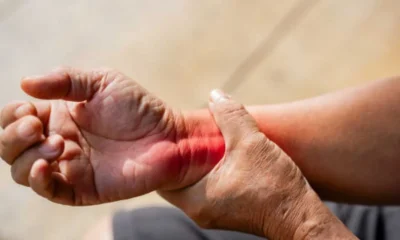HEALTH AND FITNESS
Understanding Sleep Apnea: Symptoms, Risks, and When to Get Tested

Sleep is the foundation of our physical and mental health, yet millions of Americans aren’t getting the rest they need—not because of stress or poor habits, but due to a hidden sleep disorder called sleep apnea. If you’ve ever woken up feeling tired despite a full night in bed, or if your partner has noticed your loud snoring and restless sleep, you might be experiencing the warning signs of this common but often undiagnosed condition.
Table of Contents
What Is Sleep Apnea?
Sleep apnea is a serious sleep disorder where you’re breathing repeatedly stops and starts during sleep. These interruptions can last from a few seconds to over a minute and can happen dozens or even hundreds of times a night. Each time your breathing stops, your brain wakes you up just enough to restart it—often without you even realizing. Over time, this leads to poor sleep quality, chronic fatigue, and a range of health complications.
There are two primary types:
- Obstructive Sleep Apnea (OSA): The most common type, caused by a physical blockage of the airway, usually when the soft tissue at the back of your throat collapses during sleep.
- Central Sleep Apnea (CSA): Less common, this type occurs when your brain fails to send the right signals to the muscles that control breathing.
Common Symptoms of Sleep Apnea
Recognizing the signs of sleep apnea is the first step to reclaiming your health. Many symptoms are mistakenly attributed to aging, stress, or other lifestyle factors, which is why sleep apnea often goes undiagnosed.
Here are the most common symptoms to watch for:
- Loud, chronic snoring (often noticed by a partner)
- Episodes of Stop breathing during sleep
- Gasping or choking for air during the night
- Excessive daytime sleepiness or fatigue
- Morning headaches
- Difficulty concentrating or memory problems
- Mood changes, such as irritability or depression
- Waking up with a dry mouth or sore throat
- Frequent nighttime urination
If you or your loved ones recognize several of these symptoms, it’s important to take them seriously untreated sleep apnea can have major health consequences.
Why Getting Tested Matters: The Role of the Home Sleep Apnea Test
The good news is that sleep apnea is treatable—but the first step is getting a proper diagnosis. In the past, diagnosing sleep apnea meant spending a night at a sleep center, hooked up to wires and monitors. While traditional in-lab sleep studies (polysomnography) are still considered the gold standard, they can be expensive, inconvenient, and often require long wait times.
Today, theHome Sleep Apnea Test (HSAT) has revolutionized the way Americans can get tested for sleep apnea—making the process faster, more comfortable, and more affordable.
What is a Home Sleep Apnea Test?
A Home Sleep Apnea Test is a simplified version of a sleep study that you can do in the comfort of your own bed. The device is easy to use and typically monitors your breathing, oxygen levels, heart rate, and sometimes movement while you sleep. Most HSAT devices are worn like a small monitor with a nasal cannula and a sensor attached to your finger.
Who Should Consider a Home Sleep Apnea Test?
You may be a good candidate for a Home Sleep Apnea Test if you:
- Regularly experience the symptoms listed above (loud snoring, daytime fatigue, etc.)
- Have risk factors such as obesity, high blood pressure, diabetes, or a family history of sleep apnea
- Prefer a convenient and less expensive option than an overnight stay in a sleep clinic
Your primary care doctor or a sleep specialist can help determine if a home test is right for you, or if you require a more comprehensive sleep study in a lab.
Benefits of Home Sleep Apnea Testing
- Convenience: Take the test at home in your own bed—no need for an overnight clinic stays.
- Affordability: Home tests are typically much less expensive than in-lab studies and are covered by many insurance plans.
- Speed: Get results and start treatment faster, often within days.
- Comfort: Testing in a familiar environment may give more accurate results for many people.
What Are the Risks of Untreated Sleep Apnea?
Sleep apnea is much more than just loud snoring. When left untreated, it can significantly raise your risk for serious health problems:
1. Cardiovascular Disease
Repeated drops in oxygen and surges in blood pressure during apneic events put enormous strain on the heart. Sleep apnea is strongly linked to:
- High blood pressure (hypertension)
- Heart attacks
- Stroke
- Irregular heartbeats (arrhythmias)
- Heart failure
2. Diabetes and Metabolic Issues
Sleep apnea can make it harder for your body to regulate blood sugar, increasing the risk of developing type 2 diabetes and complicating its management.
3. Daytime Accidents
Severe daytime drowsiness from poor sleep increases the likelihood of car accidents, workplace injuries, and falls.
4. Mental Health Problems
Chronic sleep deprivation can worsen depression, anxiety, memory, and focus. It may also contribute to mood swings and lower overall quality of life.
5. Other Risks
- Weakened immune system
- Increased risk of certain cancers
- Erectile dysfunction and reduced libido
When Should You Get Tested for Sleep Apnea?
Because sleep apnea is often underdiagnosed, it’s important to know when to seek help. Consider getting tested if you:
- Snore loudly or wake up gasping for air
- Experience excessive sleepiness during the day, even after a full night’s sleep
- Have risk factors like obesity, high blood pressure, or a family history of sleep disorders
- Notice mood changes, memory issues, or difficulty focusing
- Have been told you stop breathing during sleep
Even if you live alone, pay attention to symptoms like morning headaches, dry mouth, or persistent fatigue.
Speak to a Sleep Specialist
If you recognize these warning signs, talk to your doctor about your concerns. They can refer you to a sleep specialist who will evaluate your symptoms and decide whether a Home Sleep Apnea Test or an in-lab study is appropriate.
How Is Sleep Apnea Treated?
The best treatment depends on the type and severity of your sleep apnea, as well as your overall health. Treatment options include:
1. Lifestyle Changes
- Losing weight (if overweight)
- Sleeping on your side
- Avoiding alcohol or sedatives before bed
- Stopping smoking
2. CPAP Therapy
The most common and effective treatment for moderate to severe obstructive sleep apnea is Continuous Positive Airway Pressure (CPAP). A CPAP machine keeps your airway open with a gentle stream of air delivered through a mask worn while you sleep.
3. Oral Appliances
Custom-fitted dental devices can help keep your airway open by repositioning your jaw or tongue—ideal for some cases of mild to moderate sleep apnea.
4. Surgery
In certain cases, surgical procedures may be recommended to remove tissue or reposition parts of the airway.
5. Emerging Therapies
Other treatments, such as nerve stimulation devices or newer therapies, are available for people who can’t tolerate CPAP or oral appliances.
Remember: Successful management starts with an accurate diagnosis. Taking a Home Sleep Apnea Test can be a crucial first step.
Frequently Asked Questions About Sleep Apnea and Home Sleep Apnea Tests
Q: Is a Home Sleep Apnea Test as accurate as a sleep study in a clinic?
A: For many people with moderate to severe symptoms, a home test is highly accurate and can confirm a diagnosis of obstructive sleep apnea. However, it may not detect all types of sleep disorders, so a sleep specialist may recommend an in-lab study if results are unclear or if complex sleep problems are suspected.
Q: Will insurance cover a Home Sleep Apnea Test?
A: Most US insurance plans, including Medicare, cover medically necessary home sleep apnea testing if recommended by a physician. Always check with your provider for specific coverage details.
Q: What happens after the test?
A: Your sleep data is reviewed by a board-certified sleep physician. If sleep apnea is diagnosed, your provider will discuss the best treatment options for your situation.
Take Action: Don’t Ignore the Warning Signs
Sleep apnea is common, dangerous, and treatable. Don’t let it silently undermine your health and quality of life. If you suspect you may have sleep apnea, take the first step by talking to your doctor or a sleep specialist. A simple, convenient Home Sleep Apnea Test can be your ticket to better sleep—and a healthier, more energetic life.
-

 GENERAL4 weeks ago
GENERAL4 weeks agoChristofle – For Those Who Dream of Family Heirloom Silver
-

 GENERAL3 months ago
GENERAL3 months agoUncovering the World of кинокрадко: The Dark Side of Film Piracy
-

 GENERAL1 month ago
GENERAL1 month agoUnveiling the Art of преводсч: How Translators Bridge Language Barriers
-

 SPORTS3 months ago
SPORTS3 months agoDiscover the World of Football with Streameast: Watch Your Favorite Leagues and Tournaments



























